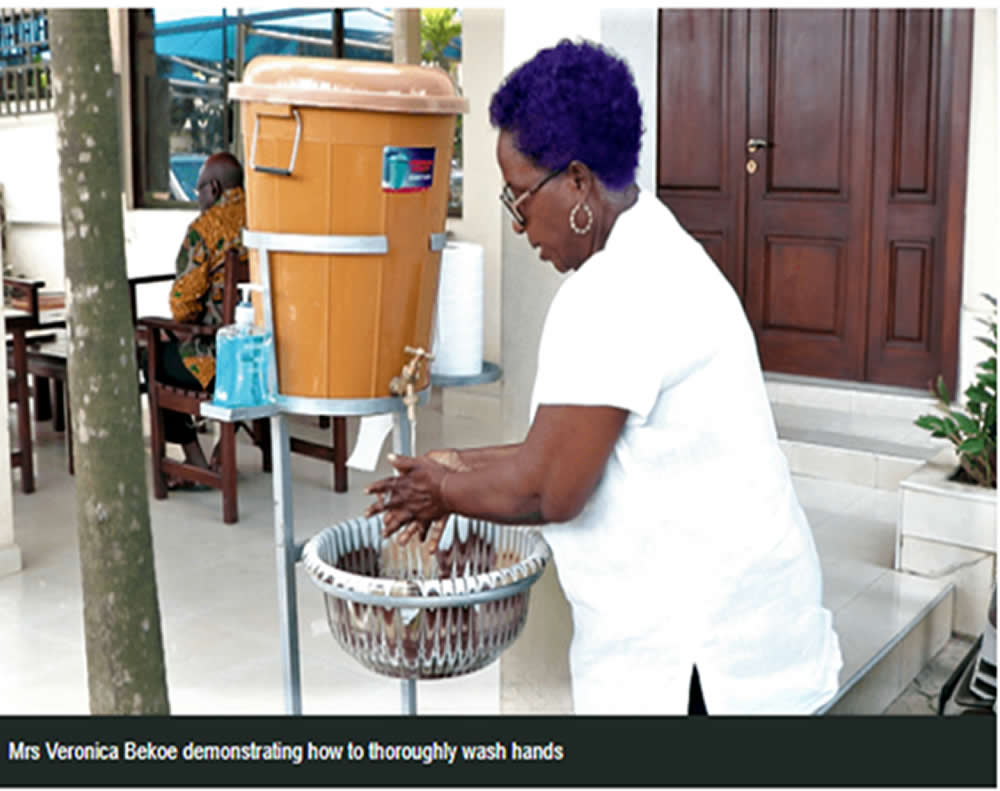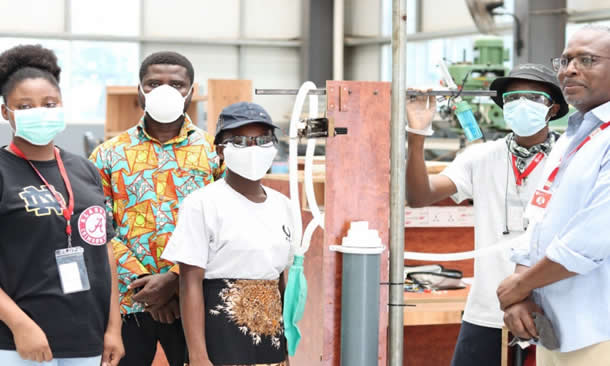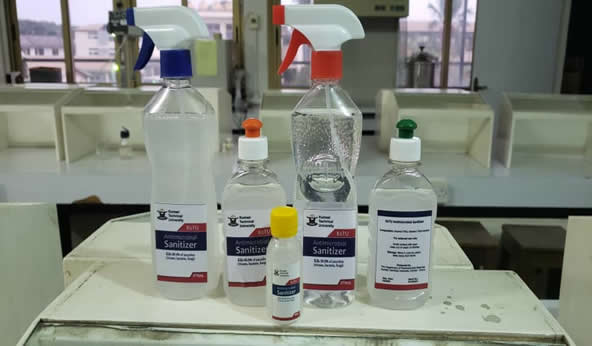The first, and perhaps most important element of a meaningful access is use -- more than merely owning or being close to some particular technology, people must actually use it, and develop skills and approaches to using it that are relevant to their lives.
--Adam Banks
The war against the Covid-19 pandemic, the world over, is understandably fueled by the logic of fear. Like a thief in the night, this fear has robbed humanity of our joi de vivre, and constantly reminds us of deaths, economic meltdowns, and disruptions in the social order as we know it.
A major consequence of the pandemic is that it has practically forced nations to adapt, adopt, and (re)engineer technology—the totality of the means employed by a people to provide for itself the objects of material culture, à la communication professor Jennifer Slack)—to win the fight against the malady.
As Ghana’s President Nana Addo Danquah Akufo-Addo intimated in his fifth address to the nation, “Necessity indeed is the mother of invention,” thereby calling upon Ghanaians to respond to the situation. To re-enunciate, the edict by African American scholar Adam Banks, black technologies, more than ever, must be endowed with saving graces.
The raison d’être for writing this article is to catalogue the technological genius of the African in responding to the existential threat, focusing on Ghana’s success stories. I do so with the hope to showcase our resolve towards self-reliance, resilience, and ultimate drive to achieving what Argentine social theorist Walter Mignolo has termed “epistemic de-linking”. I begin by penciling two types of technologies designed in the fight against the disease: (a) mundane tech and (b) high tech.
What these technologies point to, then, is whether all the social, cultural, economic, educational, and technological tinkering will be a flash in the pan after we “get out of the woods,” and how African governments hope to proceed with the vibrant participation of the private sector in a post-Covid 19 epoch.
My overarching goal is to encourage the governments of African states not to fall into what I have termed “the Veronica trap”. I use this metaphor in an effort to explain the tendency of a people to soon forget about their losses with the passage of time.
The term draws inspiration from the story of how the inventor of the Veronica bucket, KNUST trained biological scientist, Mrs. Veronica Bekoe, has still not received patent for her invention despite her impressive contribution to reduce diarrhea cases in Ghana and on the African continent.
Although she has been honoured by institutions such as the Ghana Health Service, and in 2019 was among seven other women to be celebrated by the First Lady, Rebecca Akufo-Addo, to climax the celebration of International Women’s Day (ghanaweb.com), I submit that but for the Covid-19 pandemic, many of us may never have heard of her invention. Therefore, I encourage state and non-state actors to act in concert in order to ensure the sustainability and viability of the following under-listed technologies:
1. The Veronica bucket
As stated earlier, the Veronica bucket predates the pandemic.

This mundane technology has proved to be one of the most useful technologies in meeting the basic safety precautions of handwashing with soap under running water espoused by the World Health Organization in order to decimate the envelope-like nature of nCOv 19.
In Ghana the device has been useful in both private and public places where access to running water is difficult to come by.
2. Ghana-made nose mask
Following the shortage and unavailability of personal protective equipment (PPEs) such as gloves, nose masks and protective gears in many parts of the world, both industries and private individuals had had to either make a shift in their line of production or begin producing PPEs in large quantities.

What is remarkable about Ghana’s story is that nose masks are being produced mainly by the youth with the signature Ghanaian kente and Ghanaian textile prints.
The picture below is insightful as it represents an endorsement of the design by Dr. Alex Okoe Boye, amedical practitioner, who was being vetted as Deputy Minister of Health by the Parliament of Ghana.
3. Hand sanitizers
Readers will recall that following the first press conference jointly hosted by the Ministry of Information and Ministry of Health that Ghana had recorded its first two cases on March 12, there suddenly was a shortage of hand sanitizers followed by a hike in prices of the products.

In responding to the crisis, some companies such as Kasapreko ventured into the production of hand sanitizers. What is remarkable to me is the attempt by Kumasi Technical University to produce and, then, distribute gratis its own product in some suburbs of Kumasi.
4. Automated hand sanitizer
This technology was designed in Kumasi by Richard Kwarteng and his team, Edem Coffie, a welder, and Amankwah Boakye, an electrician. This automatic recycled device is made up of a compartmentalized barrel (commonly known as ankore in Ghanaian parlance) that holds clean water, soap, and the waste water, a solar system to pump the water, sensors programmed for 25 seconds (in line with WHO protocol for hand washing).
The sensors are important to prevent hands from touching the tap. The technology also has an alarm system which as soon as it goes off prevents flow of water. He told Graphic Online that the barrel has the capacity to hold up to 80 liters of water, enough for 150 people to wash their hands before it is refilled.
5. Face shield
There also have been attempts at producing face shields in the country. An example is McHammah Engineering. The company believes that the shields can also be worn by security personnel who are enforcing lockdown restrictions in the Greater Accra and Greater Kumasi areas.
6. The low-cost ventilator
The essence of a ventilator is basically to pump air. With only 67 ventilators in Ghana (cititv), the idea of producing low-cost ventilators to help Covid 19 patients suffering from critical respiratory difficulties is impressive. Hoping to cost about a 1000 Ghana cedis (less than 200 US dollars), it is hoped that Government will invest massively in this technology in a resource-limited economy such as Ghana’s. The mechanical ventilators are expected to help patients by assisting their lungs to inhale and exhale air (Ghana News Agency, April 9, 2020).
7. And how about COA FS?
With episodic successes in countries such as China, Italy, and Ivory Coast, the Center for Awareness Food Supplement (COA FS), manufactured by Cape Coast-based Prof. Dr. Samuel Ato Duncan, is yet to meet standardization with respect to the fight against the Covid-19 pandemic.

Meanwhile a 2019 study funded by the University of KwaZulu-Natal by Kehinde and colleagues has suggested that COA FS possesses anti-HIV features, and, therefore, proves to be an effective anti-viral resistant. It is our hope that Government remains committed to ensuring that the immune booster meet the scientific litmus test while fast-tracking biomedical requirements in order to save lives not only in Ghana but across the globe.
The way forward
With an already thriving Covid 19 Information Center and a Covid 19 medical response team, what remains to be done, I daresay is to put together a team of experts focused on creating tomorrow’s future. The silver lining in this whole drama is that it has awaken the entrepreneurial drive of the Ghanaian. And that must really count. For this too shall surely pass.
The author, Dr. Wincharles Coker, is a critical communication theorist who specializes in communication education, and is the editor of the soon-to-be launched University of Cape Coast UTAG’s online news bulletin.
References
Banks, A. (2006). Race, rhetoric, and technology: Searching for higher ground. Mahwah, NJ: Lawrence Erlbaum Associates.
Kehinde, I., Ramharack, P., Nlooto, M. & Gordon, M. (2019). The pharmacokinetic properties of HIV-1 protease inhibitors: A computational perspective on herbal phytochemicals. Heliyon, 5(10): e02565.
Mignolo, W. (2007). Delinking: The rhetoric of modernity, the logic of coloniality and the grammar of de-coloniality. Cultural Studies, 21 (2-3), 449-514.
Slack, J. D. (1984). Communication technologies and society: Conceptions of causality and the politics of technological intervention. Ablex Publishing Corporation: Norwoord, NJ.
Latest Stories
-
‘Liars won’t go to heaven’ – Mahama jabs Akufo-Addo on dumsor claims
26 mins -
Coalition of District Assembly Members endorse Mahama
35 mins -
Thaddeus Sory: Of bat wisdom and cry babies
1 hour -
COCOBOD trains technical staff in soilless technology
1 hour -
Barker-Vormawor urges GRA, OSP to probe Rev. Kusi Boateng on money laundering grounds
1 hour -
Election 2024: Ghana Mineworkers’ Union calls for transparent, peaceful electoral process
2 hours -
Entrepreneurship with Bola Ray winners walk away with GHC20k & phone
2 hours -
Pass new Labour Bill before leaving office – Ghana Mineworkers’ Union to Akufo-Addo
2 hours -
I like Mahama; give him another chance – Nigerian actor RMD
2 hours -
We need immediate dissolution of National Cathedral Secretariat – Ablakwa
2 hours -
Sinapi Aba Savings and Loans honoured at maiden AGI Ghana Industry and Quality Awards
2 hours -
PMMC puts Ghana’s gold on top of Africa and the world
2 hours -
Bawumia pledges to complete Agenda 111 in first year if elected
2 hours -
NDC V/R campaign logistics member rallies Keta residents for unity and progress
2 hours -
NDC V/R Campaign Logistic Committee member calls for support for party’s vision
3 hours
